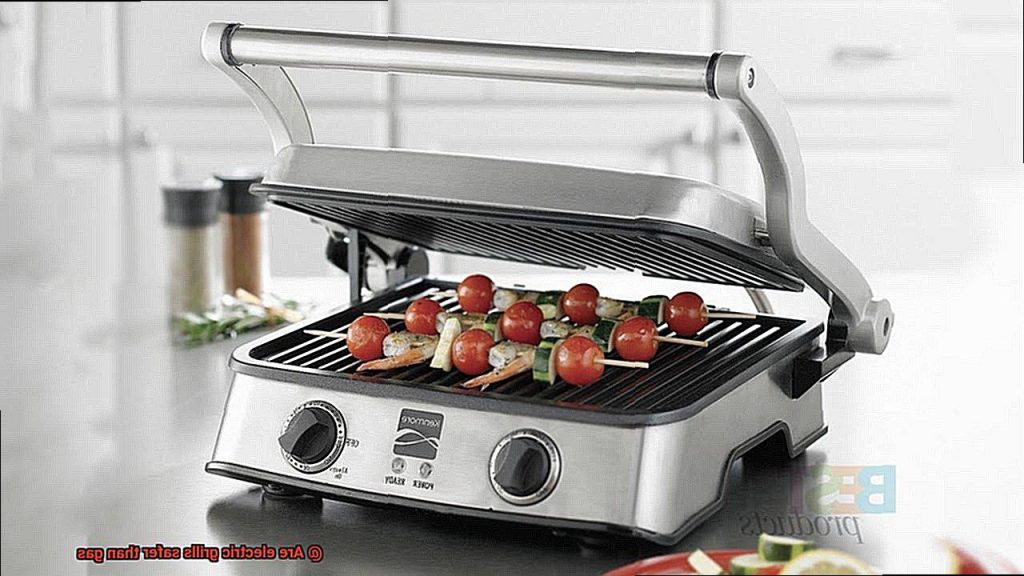It’s that time of year again – grilling season. And with it comes the age-old question: electric or gas grill? While both options have their advantages and disadvantages, safety is a top priority when it comes to cooking outdoors. So, which one is safer: electric or gas?
As an expert on the topic, I can tell you that there are several factors to consider before making your decision. In this post, we’ll take a deep dive into the safety aspects of both types of grills, comparing them side by side so you can make an informed choice.
We’ll examine the potential hazards of gas grills – from gas leaks to flare-ups – and explore why electric grills are often considered a safer option. Not only do they eliminate the risk of gas leaks and explosions, but they also provide clean, smoke-free cooking and are incredibly convenient.
But wait – don’t write off electric grills just yet. There are some common misconceptions about them that might make you hesitant to switch over. We’ll address those too so you can make an informed decision.
Whether you’re a seasoned pro or new to grilling altogether, this post will give you all the information you need to choose between an electric or gas grill. By the end of it, you’ll be able to confidently select the best option for you and your family’s safety while still enjoying delicious outdoor meals all summer long.
Contents
The Pros of Electric Grills
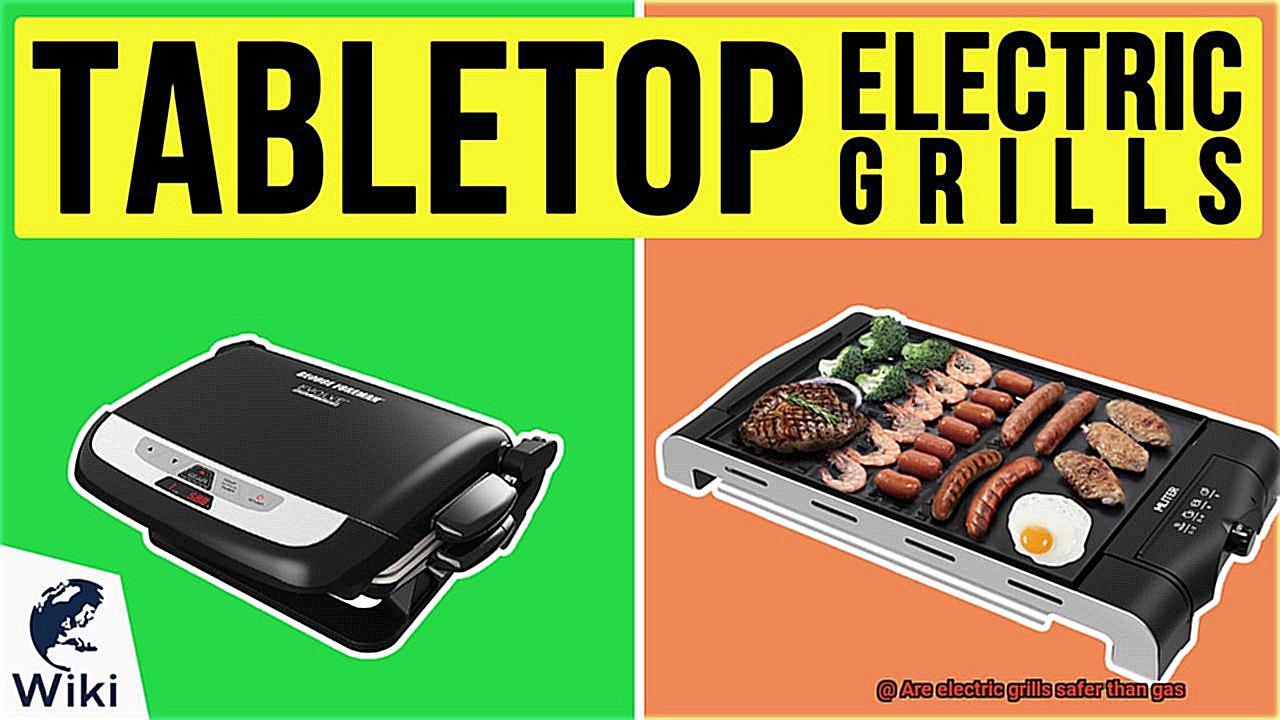
Electric grills may be the perfect solution for you. Not only are they safer than gas grills, but they also offer a range of benefits that make them a popular choice among grill enthusiasts.
The safety features of electric grills are one of their biggest advantages. Unlike gas grills which emit harmful gases and produce flames, electric grills are flameless and emit no harmful fumes like carbon monoxide. This makes them ideal for indoor use or in areas where open flames are not permitted.
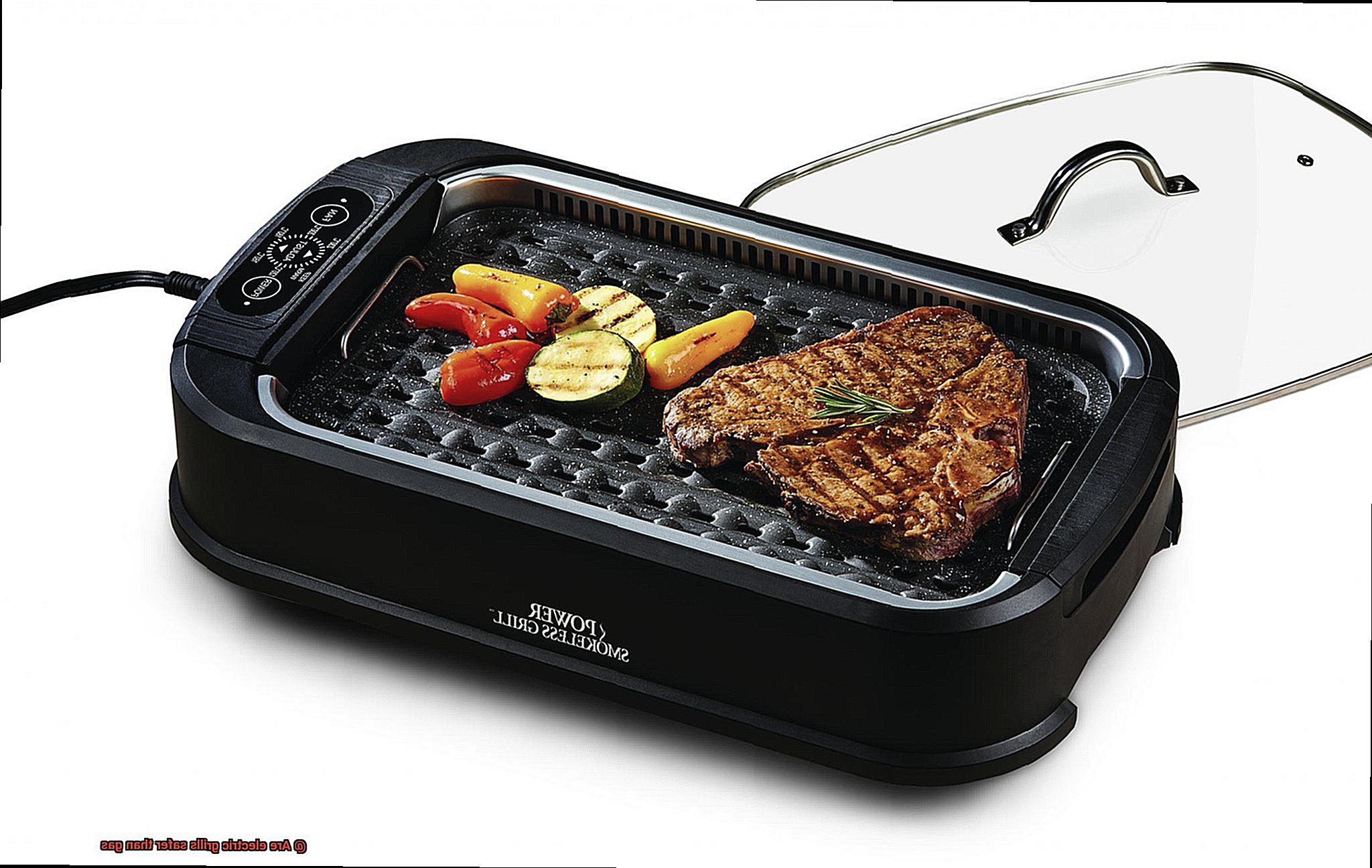
In addition to being safe, electric grills are incredibly easy to use. With just an electrical outlet, you can start cooking in just a few minutes. They also offer consistent temperature control, allowing for even cooking and preventing food from burning. Moreover, adjustable heat settings allow you to customize the temperature to suit your cooking needs.
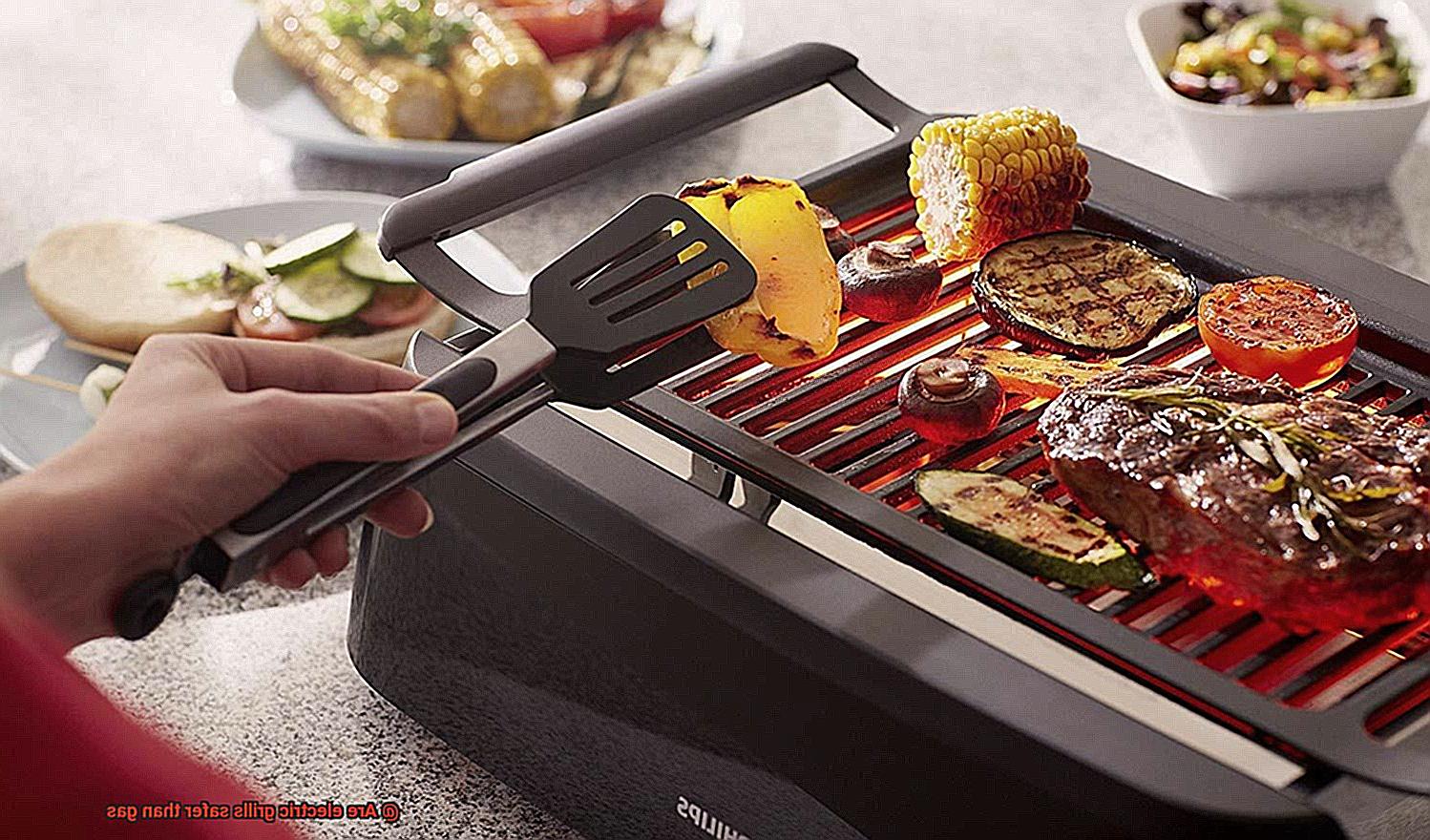
Cleaning up after a cookout is also a breeze with electric grills. They don’t produce grease or ash like gas grills do, making them easier to clean. Most models come with removable grates and drip trays that can be quickly and easily cleaned in the dishwasher.
Electric grills are also incredibly versatile, with models available in a range of sizes and styles to fit your cooking needs. You can use them to grill burgers and steaks or cook vegetables and seafood.
While electric grills may have some safety considerations such as overheating or causing burns if not used properly, they are generally considered safer than gas grills. Their convenience and ease of use make them an attractive choice for those who want to enjoy the taste of grilled food without the hassle and risks associated with gas grills.
The Cons of Electric Grills
Grilling is a beloved pastime for many, and while electric grills have their benefits, they also come with some significant drawbacks. As an expert in this field, I have researched and compiled a list of the cons of electric grills that you should consider before making your final decision.
One significant disadvantage of electric grills is their slower preheating time. Unlike gas grills that heat up quickly, electric grills require a longer preheating time before you can start cooking. This delay can be frustrating for those who prefer to grill up their meals quickly.
Another disadvantage of electric grills is their lower heat output compared to gas grills. This can make it challenging to sear meats and create those iconic grill marks that everyone loves. Additionally, the lower heat output can lead to longer cooking times and less flavorful food.
Electric grills are also more expensive than gas grills, which can be a deal-breaker for those on a budget. Moreover, many electric grills require special electrical outlets that can be costly to install if they’re not already present in your outdoor space.
Lastly, electric grills are not as environmentally friendly as their gas counterparts. While gas grills do produce some emissions, they are generally considered cleaner than coal or wood-burning grills. Electric grills rely on power from the grid, which may come from non-renewable sources.

Despite these drawbacks, many people still prefer electric grills for their convenience and ease of use. If you prioritize convenience over speed and high heat output, an electric grill might be the right choice for you.
The Pros of Gas Grills
With their convenience and speed, they’ve become a popular choice for many who want to enjoy delicious grilled meals without the hassle of traditional charcoal grills.
One of the biggest advantages of gas grills is their quick heating time. You don’t have to wait around for charcoal to heat up; with a gas grill, you can start cooking within minutes. And with precise temperature control, you can adjust the heat easily, giving you the perfect cooking environment every time.
But that’s not all – gas grills are also incredibly versatile. You can use them for various cooking techniques such as grilling, searing, and smoking. Whether you’re in the mood for juicy burgers or perfectly cooked steaks, a gas grill can handle it all. And when it comes to maintenance, they’re a breeze to clean since they don’t produce any ash or charcoal residues.
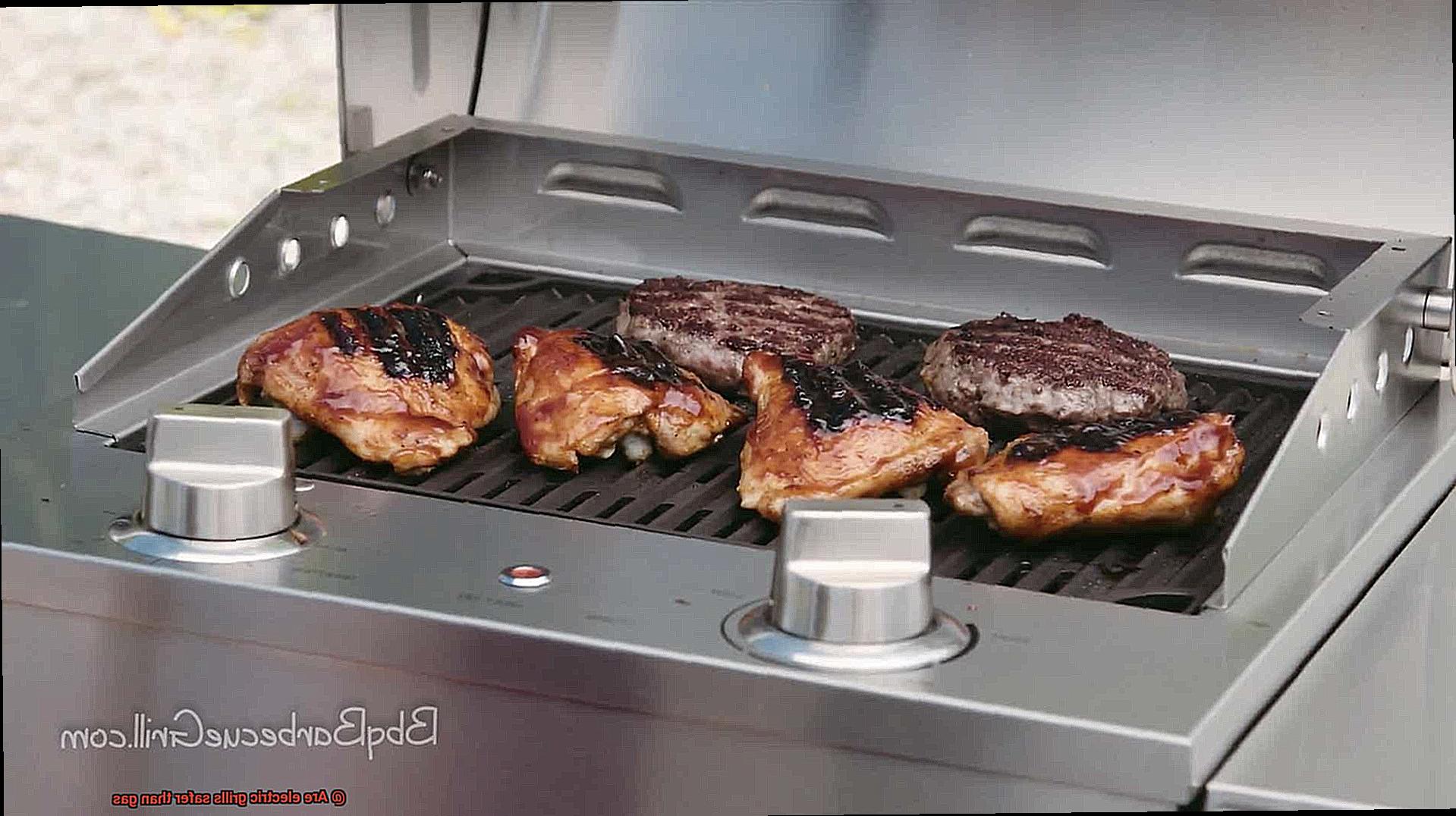
What’s more, gas grills are relatively inexpensive compared to other outdoor cooking appliances like pellet grills or ceramic kamado-style grills. This means you can get all the benefits of a high-quality grill without breaking the bank.
When it comes to safety, gas grills are generally safe to use as long as you follow the manufacturer’s instructions and handle them properly. However, there are some safety concerns associated with gas grills, especially when it comes to propane gas. It’s highly flammable and can pose a risk if not handled properly. So be sure to keep your gas grill away from combustible materials like trees or buildings and always follow the manufacturer’s instructions.
The Cons of Gas Grills
While gas grills offer convenience and versatility, there are several factors to consider before making the investment.
Safety concerns are one of the main drawbacks of gas grills. Gas leaks can occur if the grill is not properly maintained or if there is damage to the gas line, which can lead to a dangerous fire hazard. To mitigate this risk, it’s essential to regularly check your gas line and connections for damage and ensure that your grill is placed away from any flammable materials. Additionally, improper ventilation can result in a build-up of carbon monoxide – a silent killer. Always use your gas grill in a well-ventilated area and never use it indoors.
Another factor to keep in mind is the cost associated with gas grills. While they may be more convenient than traditional charcoal grills, they often come with a higher price tag. The initial cost of a gas grill can be steep, and ongoing costs include propane tank refills or natural gas hookup fees. Furthermore, keeping up with regular maintenance and cleaning can add up over time.
In summary, while gas grills are undoubtedly popular for outdoor cooking, there are some drawbacks to consider. Below are some key takeaways:
- Safety concerns such as fire hazards and carbon monoxide poisoning should be taken seriously.
- Regular maintenance is necessary to ensure that your grill functions properly.
- Gas grills can be more expensive than other options.
Safety Considerations for Electric Grills
When it comes to outdoor cooking, safety should be your top priority. Electric grills offer a safer option compared to gas grills, but there are still some safety considerations to keep in mind.
One of the most significant advantages of electric grills is that they do not produce open flames like gas grills do, which eliminates the risk of flare-ups and explosions. Additionally, electric grills do not emit carbon monoxide, a dangerous gas that can be produced by gas grills. These features make electric grills an ideal choice for those who are new to grilling or those who are concerned about potential fire hazards.
However, it’s important to remember that electric grills require electricity to operate. This means that you’ll need to plug your grill into an electrical outlet, which can pose a tripping hazard if the cord isn’t placed in a safe location. Make sure the cord is out of the way of foot traffic and not in danger of being damaged or frayed.
Maintenance and cleaning are also critical when it comes to electric grills. They are generally easier and safer to clean than gas grills since there are no propane tanks or gas lines to worry about. Besides, many electric grills come with removable heating elements that make cleaning a breeze.
However, the heating element on an electric grill can become extremely hot and cause burns if touched. It’s essential to let the grill cool down before cleaning or performing any maintenance tasks. As with any electrical appliance, there is always a risk of electrical shock if the grill isn’t used correctly or comes into contact with water.
Here are some other safety tips to keep in mind when using an electric grill:
- Always use the grill outdoors in a well-ventilated area.
- Keep flammable materials away from the grill.
- Do not leave the grill unattended while it’s on.
- Follow the manufacturer’s instructions for proper usage and maintenance.
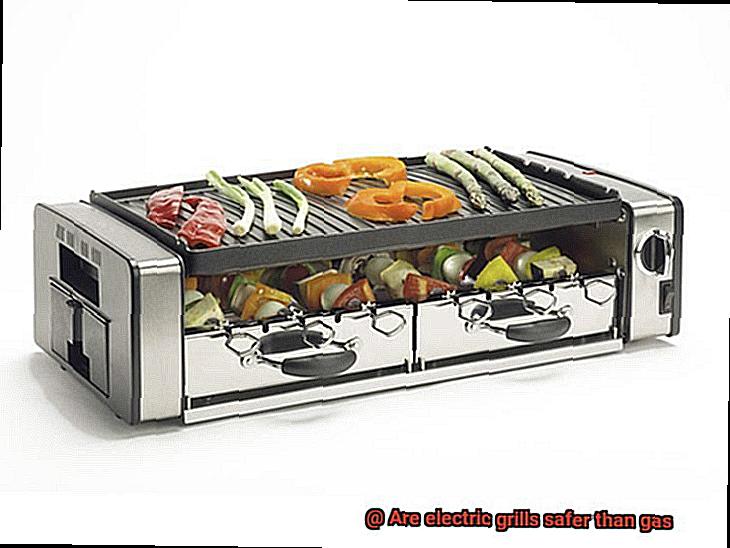
Safety Considerations for Gas Grills
Outdoor grilling is a fantastic way to enjoy the warm weather and delicious food. However, gas grills are not without their safety concerns. As an expert on gas grill safety, I want to share some crucial information to ensure that you can enjoy your grilling experience with peace of mind.
One of the most significant risks associated with gas grills is fire and explosion. To minimize this risk, it is essential to follow proper safety guidelines such as regular maintenance and inspections of the grill and its components. Additionally, checking for gas leaks by applying a soap and water solution to the gas connections and hoses can prevent dangerous situations. Always keep your grill away from flammable objects like buildings, trees, or patio furniture. Never leave your grill unattended while it’s in use.
Another crucial safety consideration is carbon monoxide poisoning. This colorless, odorless gas can build up quickly when using a gas grill in an enclosed space like a garage or porch. To avoid this danger, always use your gas grill in a well-ventilated outdoor area.
In addition to these major safety concerns, there are other risks associated with gas grilling that you should be aware of. For example, grease buildup on the grates can cause flare-ups, which are dangerous. Therefore, it’s important to clean your grill regularly to prevent this from happening.
To summarize, here are some essential safety tips for using a gas grill:
- Regularly inspect and maintain your grill
- Check for gas leaks
- Keep your grill away from flammable objects
- Grill in a well-ventilated outdoor area
- Clean your grill regularly
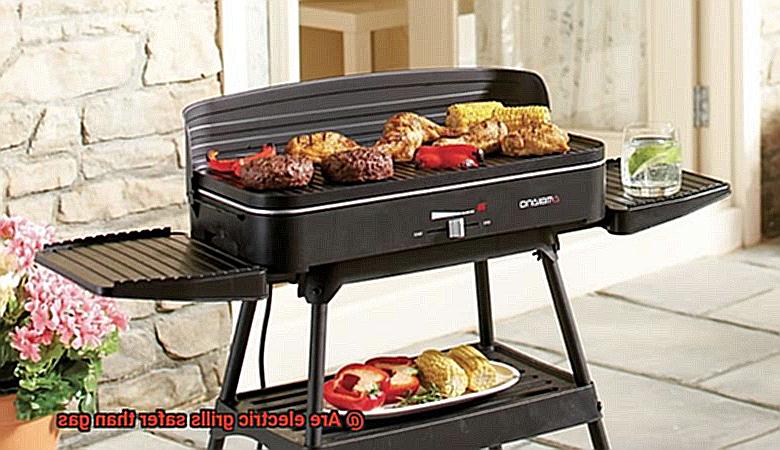
-WwyWh3mmcw” >
Conclusion
In the end, safety should be the top priority when deciding between an electric or gas grill. While both options have their advantages and disadvantages, electric grills are often considered the safer choice. With no risk of gas leaks or explosions and no harmful fumes emitted, you can feel at ease knowing your family and home are protected. Plus, they’re easy to use and clean up after with consistent temperature control.
However, electric grills do have some drawbacks to consider. They may take longer to preheat and have lower heat output, making it harder to achieve those perfect sear marks on your meats. And let’s not forget about the higher price tag and potential need for costly electrical outlets.
On the other hand, gas grills offer quick heating times and precise temperature control for various cooking techniques. But don’t forget about the safety concerns that come with them. Fire hazards and carbon monoxide poisoning should never be taken lightly, which means regular maintenance is a must.
Regardless of which type of grill you choose, always prioritize safety first. Proper usage and maintenance are key – follow manufacturer’s instructions, keep flammable materials away from the grill, never leave it unattended while in use, inspect regularly for damage or leaks, use in a well-ventilated outdoor area, and clean regularly to prevent grease buildup on the grates that can cause flare-ups.
With these precautions in mind, you’ll be able to enjoy delicious outdoor meals all summer long without compromising your safety or health.

